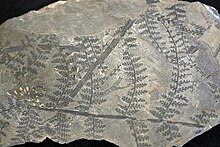Sphenopteris is a genus of seed ferns containing the foliage of various extinct plants, ranging from the Devonian to Late Cretaceous.[1][2] One species, S. höninghausi, was transferred to the genus Crossotheca in 1911.[3]
| Sphenopteris | |
|---|---|

| |
| Sphenopteris specimen found in Carboniferous rocks in Loire-Atlantique department, France | |
| Scientific classification | |
| Kingdom: | Plantae |
| Clade: | Tracheophytes |
| Division: | †Pteridospermatophyta |
| Class: | †Lyginopteridopsida |
| Order: | †Lyginopteridales |
| Family: | †Lyginopteridaceae |
| Genus: | †Sphenopteris Sternberg 1825 |
| Species | |
| |
Biology
editThe frond of Sphenopteris could be up to 20 inches (51 cm) long.[1]
Distribution
editIn Brazil, fossil of form genus Sphenopteris was located in outcrop Morro Papalé in the city of Mariana Pimentel. They are in the geopark Paleorrota in Rio Bonito Formation and date from Sakmarian in Permian.[4] Fossils of Sphenopteris have also been found in the Valle Alto Formation, Caldas, Colombia, among many other locations.[5]
References
edit- ^ a b Palmer, Douglas; et al. (2009). Prehistoric Life: The Definitive Visual History of Life on Earth (1st American ed.). New York: Dorling Kindersley. p. 149. ISBN 978-0-7566-5573-0.
- ^ Manuscript entitled, Fossil Flora and Fauna of the Pennsylvanian Period, Will County, Illinois
- ^ F. L. S., Johnson, T. D. (1911). A seed-bearing Irish Pteridosperm, Crossotheca Höninghausi, Kidston (Lyginodendron oldhamium, Williamson). Royal Dublin Society
- ^ Afloramento Morro do Papaléo, Mariana Pimentel, RS
- ^ Sphenopteris at Fossilworks.org
External links
edit